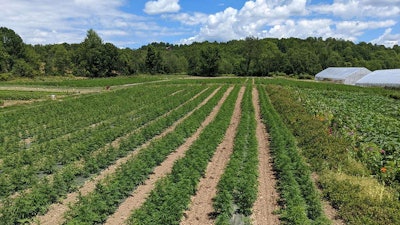
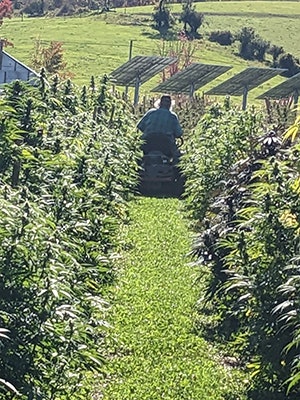
Seth Jacobs moved to upstate New York in 1983 with the hopes of owning and operating a sustainable, organic farm. He co-founded Slack Hollow Farm the same year, and has provided certified organic vegetables through farmers markets, local grocery stores and co-ops ever since.
In 2018, Slack Hollow pivoted to participate in New York’s industrial hemp pilot program. Jacobs partnered with processor Open Minded Organics in 2019 to produce CBD, and Slack Hollow Organics was born.
Last year, Gov. Kathy Hochul signed legislation into law that allowed the state’s licensed hemp farmers to apply for permits to grow cannabis for New York’s adult-use cannabis market, which former Gov. Andrew Cuomo signed into law in 2021. Jacobs jumped at the opportunity.
Now, as adult-use cannabis retailers struggle to open under a “Seeding Opportunity Initiative” that prioritized applicants with past cannabis-related convictions in the licensing process, Jacobs says the state has broken its promise to the hemp growers that stepped up to supply the market.
“They broke the deal that they made with the cultivators,” he says. “The cultivators grew the crop, the [Office of Cannabis Management] was going to get the stores open, and that’s where the crop was going to sell. We kept our side of the bargain at great personal cost.”
That cost includes extra operational and compliance expenses, Jacobs says, as well as service providers severing ties with farms upon learning that they entered the adult-use cannabis market.
“Once you become a cannabis farmer, your life becomes very different in these United States,” he says. “Aside from … all the extra overhead, all your institutions will walk away from you. You will need new banks, new insurance companies, new credit unions, new accountants—the whole thing. Your life will be turned upside down. And that’s what we put ourselves through to do this, and now there aren’t enough stores open to move the product. And there’s not much momentum there.”
Jacobs says regulatory changes are desperately needed to help sell the products that New York’s cannabis farmers produced last year—and are producing again this growing season.
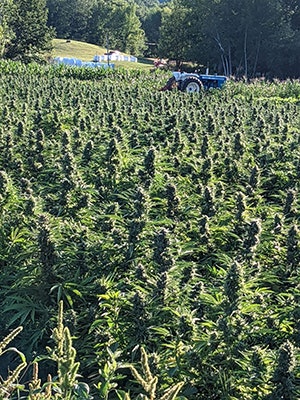
James Ansorge, counsel with Cozen O’Connor, echoes Jacobs concerns that New York’s adult-use market needs some fine-tuning in order to reach its full potential, especially in the wake of challenging economic conditions that have plagued cannabis businesses nationwide.
“We’re seeing challenges across the country,” he says. “New York isn’t alone, but you have a lot of companies, both multistate operators and small, local, minority-owned businesses, that have invested a lot of time and capital in New York, and they’ve now been waiting for a long time for their licenses. And that capital is being burned through. Now, with the excess of biomass that the farmers have, the question is, what’s that going to do to pricing? We’ve seen wholesale prices collapse in other states. I think that it’s a really challenging time to be entering the New York market with no clear timeline for when you can open, where you can open, or even how you can open.”
Jacobs says the industry is dealing with at least one lost year as the market finds its footing, and another lost year could be on the horizon without policy changes.
“It’s going to take at least another year to get to where we thought we’d be now,” he says. “This is what I call the lost year that we’re facing.”
Problematic Policy
Jacobs points to a lack of operational dispensaries as one of the main hindrances holding New York’s adult-use cannabis market back from reaching its full potential.
“There aren’t enough stores open to move the product, and there’s not much momentum there,” he says.
New York’s first adult-use sales launched in December with the opening of Housing Works Cannabis Co., a nonprofit organization that qualified for a Conditional Adult-Use Retail Dispensary (CAURD) license under the state’s Seeding Opportunity Initiative.
Since then, 13 total adult-use cannabis retailers have opened in the state, and four of those are delivery-only operations with no brick-and-mortar storefronts.
Jacobs points to a convoluted regulatory framework as one reason that more dispensaries haven’t opened yet.
“Getting through this whole [process] is an impossibility,” he says. “They’ve so overregulated it, and … they tried to run before they could even crawl.”
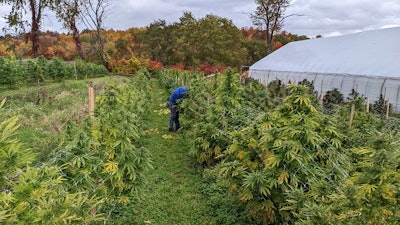
During last year’s growing season, Jacobs says regulators were writing and revising regulations as Slack Hollow cultivated its first adult-use cannabis crop.
“It’s a highly, highly regulated environment we’re operating in, so last year we were just trying to get in to grow at any cost, and we [said], ‘Well, at least it’s going to pay,’” he says. “[We said, ‘Let’s do] whatever we need to do to get this done.’ And we all turned ourselves inside out to grow the crop. But the state has a very unrealistic program for opening stores. … The CAURD program came out last March and we were promised 150 stores by the end of the year. By September, the governor promised us 20 stores by the end of the year and 20 every month after that. We should be at 120 right now, and we’re at [13]. We’re one order of magnitude away from where they said we were going to be.
“Any business that comes up an order of magnitude short on the demand side is in trouble,” Jacobs continues. “Most of the growers are in a lot of trouble right now.”
Unused Product
During last year’s growing season, Jacobs planned to primarily grow cannabis for distillate. Now, with only 13 operational adult-use retailers, he has roughly 100 liters of distillate and 500 pounds of flower that are sitting unused with no way to sell it, he says.
“I can’t do anything with it,” Jacobs says. “I’m not worrying about the deterioration of my flower because I’ve taken all the steps necessary [to preserve it], but I’m struggling to sell it. I’m only just getting my first inquiries from people who are selling on the legal market saying that they need some more.”
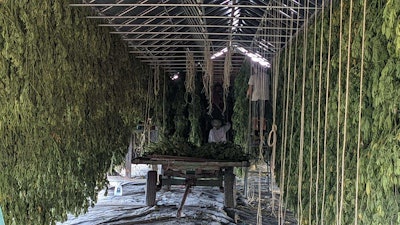
Last month, the New York Office of Cannabis Management (OCM) announced early plans to allow new pathways for direct sales to consumers; called the New York Cannabis Growers Showcase, the proposal would allow licensed cannabis businesses to set up temporary shop in a farmers market environment as a way to get products in front of consumers and move the state’s steadily growing supply.
The plan still needs to be formally proposed and approved by the governor, and Jacobs is skeptical that it will ever come to fruition.
“It would take lawyers months to figure it out, and we don’t have months,” he says. “This was supposed to be a quick solution. The regulatory environment is so complex, it’s all tied up in knots, and you have to untie so many knots to do this. As much as I want it, I’m skeptical that the regulatory framework will allow it. … It’d be great, but I can’t count on it.”
A separate set of proposed revised regulations would allow New York’s 10 medical cannabis licensees, commonly referred to as registered organizations (ROs) to expand to adult-use retail on Dec. 29, 2023—two years before originally proposed—in order to open more dispensaries across the state.
RELATED: New York’s Medical Cannabis Operators Could Switch to Adult Use by Year’s End
That proposal, like the farmers market scheme, is still finding its way through the rulemaking process.
This Year’s Growing Season
As regulators consider policy changes to ease the industry’s pain points, Jacobs says many growers have had to scale back their crop and lay off workers this year due to the oversupply of product in the marketplace. At Slack Hollow, he is pivoting to produce less distillate and more high-quality flower for smoking.
“Maybe we’ll do a speculative crop of distillate just in case the market picks up, but a lot of growers are cutting way back,” he says. “A lot of them do not have the money to get [a crop] in and are really stuck—I mean, really stuck—and are going bankrupt. A good deal of growers won’t put a crop in this year and pretty much everybody is scaling back because they can’t afford payroll.”
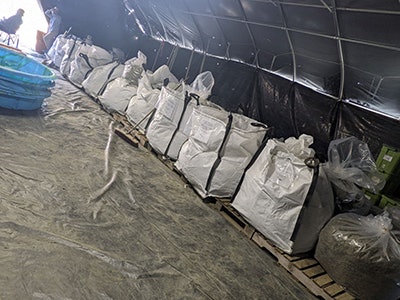
Meanwhile, the state is still grappling with a thriving illicit market; Jacobs estimates that there are roughly 1,500 unlicensed cannabis retailers in New York City alone.
“It is a huge market, and it is great, and it’s not disappointing for many, many people,” Jacobs says. “People doing indoor grows, people bringing stuff in from California—they’re doing great. They’re doing fabulous. And most of them are people who got arrested at some point and are justice involved, so, in a way, the state is making amends. But not for the people who paid thousands of dollars for licenses and turned our lives inside out. We’re not getting any benefit from it.”
Hochul signed legislation into law last month to allow the OCM to take harsher action against unlicensed cannabis retailers. The bill, part of the state budget for fiscal year 2024, allows the OCM to seize product and seek injunctions to close illicit shops, and allows the Department of Taxation and Finance (DTF) to issue fines and penalties for unpaid taxes.
Hochul’s office announced June 8 that these plans have been set in motion and that an interagency initiative has launched to stop the sale of untested cannabis products from these unlicensed shops.
“New York is proud to have undertaken the most equitable legal cannabis rollout in the nation, and the state will not stand idle as unlicensed operators break the law and sell untested products to underage New Yorkers,” Hochul said in a public statement. “These enforcement actions are critical steps to protect and help those individuals who were promised a shot to start a legal business and be successful. Additionally, these unlicensed operators undermine the state’s efforts to generate substantial funds for a social equity fund that will go into the communities that have been hardest hit by over-prosecution of the cannabis laws in the past.”
Necessary Changes
As the state works to combat the illicit market and implement regulatory changes to help licensed businesses thrive, Jacobs says regulators need to do three things: open more stores, repeal the state’s potency tax, and rethink restrictions on the existing medical cannabis operators’ participation in the adult-use market.
While the first and third points seem to be on the state’s radar already, Jacobs says officials must also reconsider the tax structure, which he calls “an abomination for the industry.”
The tax is imposed at the following rates, according to the DTF’s website:
- five-tenths of one cent (.005) per milligram of the amount of total THC for cannabis flower;
- eight-tenths of one cent (.008) per milligram of the amount of total THC for concentrated cannabis; and
- three cents (.03) per milligram of the amount of total THC for cannabis edible product.
“The potency tax will not allow this industry to get off the ground,” Jacobs says. “It’s a triple-dipping kind of tax. It falls in the middle of the supply chain, so the majority of it arrives at the retailer as a cost of goods.”
Ansorge stresses the importance of allowing New York’s ROs, some of which he has worked with in the past, to open adult-use dispensaries sooner rather than later.
“I do think [that by] green lighting the ROs to open [and] co-locate up to three dispensaries [each], the state could very quickly allow those 30 dispensaries to open,” he says. “They can help relieve some of that excess biomass from the farmers, start raising revenue for the state, and stabilize and ramp up our market immediately.”
A general licensing round would also be beneficial, Ansorge says, to get additional stores licensed and operational.
The Outlook
Ansorge has advised his New York cannabis clients that the adult-use market rollout will be “a long haul,” and that they must be patient, yet prepared, to enter the industry when the time comes.
“Have those conversations with potential real estate locations,” he says. “Get your corporate structure in place [and] line up your investors so that when that licensing round opens, you are as prepared as possible. You have your team in place, you have your structure in place, and hopefully you have your real estate in place, but it’s challenging to do those things at once because you don't want to sign things until [you know] what your probability of success is. That’s been the real conundrum of New York.”
In the long term, Ansorge and Jacobs both expect New York to have a thriving adult-use cannabis market.
“I do think eventually we will get there,” Ansorge says. “In the meantime, just be patient and be prepared for the opportunity, because hopefully we will see some more dispensaries coming online, not just CAURD, but ROs, and then a general license scheme by the end of the year or early next year.”
When that happens, Jacobs wants Slack Hollow to be there, ready to serve the state’s dispensaries.
“Sometimes, businesses go through a period where their job is to survive,” he says. “I want to survive. I want to be there when this gets sorted out. … I want to be one of the people still standing.”
Join us this year at the Paris Las Vegas Hotel & Casino for Cannabis Conference, the leading education and expo event for plant-touching businesses.























